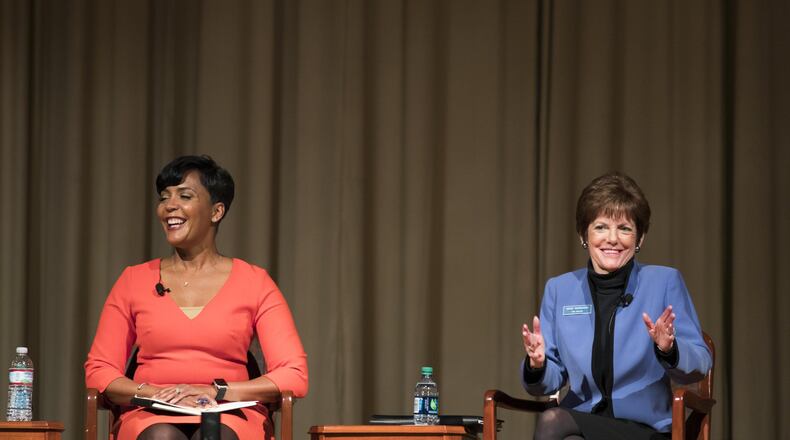The Democratic Party of Georgia’s decision to plunge headlong into the nonpartisan race for Atlanta mayor has infuriated several leading Democrats.
The party has come under fire for six-figure buys for TV and radio ads depicting Councilwoman Mary Norwood as a Trump-like figure and warning that she could be the first leader of Atlanta since the 1880s not to identify as a Democrat.
State Democrats drew less criticism in 2009 when they used a similar strategy against Norwood, a self-described independent. But this time, she has attracted a gaggle of influential Democratic supporters in her Tuesday runoff against Councilwoman Keisha Lance Bottoms.
Steve Labovitz, a Dentons attorney who was chief of staff when Bill Campbell was mayor, sent a scathing note to party Chairman DuBose Porter saying he’s “embarrassed” to call himself a Georgia Democrat and that the ad buys are a “gross misuse” of party funds that smack of hypocrisy.
“The party apparently had no problem when Mayor (Kasim) Reed refused to endorse then Sen. Jason Carter for governor. The party did not stand up and condemn Gov. Roy Barnes’ endorsement of Sen. (Johnny) Isakson last year,” he wrote. “In these cases, the party respected the relationships and intentions of our most prominent leaders. Tell me, do we apply different standards to different races?”
Other high-profile Democratic figures have echoed Labovitz’s frustrations. Former City Council President Ceasar Mitchell, a Democrat who endorsed Norwood, responded to Labovitz’s concerns with an all-caps “AMEN.”
And ex-Mayor Shirley Franklin, a former co-chairwoman of the Democratic National Convention’s platform committee and a prominent Norwood supporter, said the party should spend its resources elsewhere.
“It’s sad to watch as a Georgia Democrat because the party doesn’t seem to be worried about their own hypocrisy or record losses over the last 10-plus years,” she said. “The party might be better dedicating their resources — reputation, time and money — rebuilding the party county by county.”
Porter said in a statement that the party is simply fulfilling its mission.
“We’re in the business of electing Democrats,” he said. “Everyone is free to pick their own candidate, we picked ours, and we’re confident that Keisha Lance Bottoms is the mayor Atlanta needs.”
In tandem, state Democrats sent a press release of Norwood's "Trumpesque campaign tactics." They include her claim in a June interview that her 2009 defeat to Reed was partly due to widespread voter fraud.
And Michael Coleman, a former city attorney who served in Mayor Maynard Jackson’s administration, wrote his own letter to Porter backing the party “for doing exactly what it should do – support the Democratic candidate in Atlanta’s mayoral race.”
“How ironic it would be for Atlanta to be the one place in the country where the Republican Party receives some traction in the age of Trump,” he wrote, adding that the party “is absolutely correct to try and avoid that fate.”
Norwood has long bristled at the attacks that she’s a closet Republican. She’s said she voted for both Barack Obama and Hillary Clinton and calls herself a “progressive independent” who wants to maintain her political neutrality so she can better work across party lines.
Bottoms, meanwhile, has also embraced that attack in the final stretch of the race. She calls herself the true Democrat in the race, and she pushed back at a question at a Tuesday debate about whether the Democratic Party’s message is “becoming very racist.”
Norwood is vying to become the city’s first white mayor since 1973, and her strength is rooted in Buckhead and other parts of the city heavily populated by whites. Bottoms’ base is in south Atlanta, where voters are predominantly African-American.
In her view, Bottoms said, Norwood has forced the party's hand by struggling with questions in previous forums involving racial profiling and Donald Trump.
About the Author
Keep Reading
The Latest
Featured


